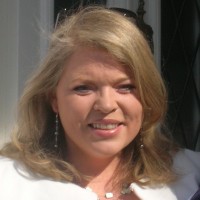Starting your own publishing house: Karen Sullivan interview

Abbie Headon finds out about the joys and challenges of running your own publishing house, from Bookseller Rising Star Karen Sullivan, founder of Orenda Books.
1) Some people would say it’s a huge risk to start your own publishing house; what made you want to do this, instead of working for somebody else?
A lot of reasons, really. First of all, I have been freelance for most of my working life, and I am definitely someone who likes to be in control (the term ‘control freak’ springs to mind). There is a certain satisfaction to be had from working with authors and their books from acquisition straight through to marketing, PR and sales, and ensuring that the passion that inspired the original purchase is maintained. The truth is, too, that publishing is an ever-changing industry, and having been an author myself, I wanted to try out a model that I was convinced would work. Working for someone else wouldn’t allow me the flexibility to experiment.
2) If you had to define your commissioning in one sentence, what would it be?
Outstanding writing, fresh voices, books that push the boundaries of a genre, or cross them, top-class plotting and classy international literature.
3) Being your own boss means you have the freedom to make your own decisions, which must be great. What are the other advantages of running your own publishing house?
Although it leaves me exposed to some extent, as the list is very much my taste, it also means that I am involved at every stage, and can make decisions to ensure the success of each and every book, from working with the jacket designer and editing to making sure everyone knows about it. There is no one looking over my shoulder and suggesting that an author should be dropped because a book is taking a little longer to pick up steam; there is no one halfheartedly promoting my books, or not ‘getting’ why I purchased it.
No book is ever ‘backlist’ here, either. We continue to promote our amazing books and authors constantly … you never know when there will be a turning point that will create that all-important buzz that translates into sales.
I wanted to create a team mentality here, and that would be much harder in a larger company, even as an imprint. I work extremely long hours, but because it’s all mine, it’s more like fun than work!
4) And, because every up has a down to balance it, what do you find most challenging?
I suppose that like everyone in the industry, we struggle a little with a very crowded marketplace. There are a lot of self-published authors, a lot of ebook-only publishers who are putting out a lot of books in a very short period of time. While great books will always rise to the top – and be memorable, not disposable reads – it can be harder to create and maintain the discoverability factor.
Cash flow can be a nightmare … and this is often the result of successful books, with unscheduled reprints and unexpected marketing spend. But that’s a good problem to have in the long run!
I struggle a little with metadata, which is becoming an increasingly sophisticated mechanism for securing good sales. I think it could probably be a full-time job!
We’ve been lucky to get the support of the major retailers, with a good proportion of our books now core stock, but every new book requires an imaginative and convincing approach and that, too, can be a challenge! All in all, though, the downs are minor in comparison to the ups!
5) Finally, what advice do you have for somebody who’d like to start their own publishing company?
I would say go for it! If you stick to your vision and work hard, are prepared to be flexible in a changeable market, treat your authors well, and love what you do, it can work. It is expensive and nail-biting at times, but it is, quite honestly, the most rewarding job I’ve ever done. I love it. Every single day.





Exactly my sentiment. I started my own publishing house last year and although it can be tiring and sometimes nightmarish, I think I took the right decision. I did my MA in Publishing at Derby University to be able to get into this completely new adventure after I retired from my job as a lecturer. The hardest bit for me has been to establish connections with bookstores such as Waterstones.